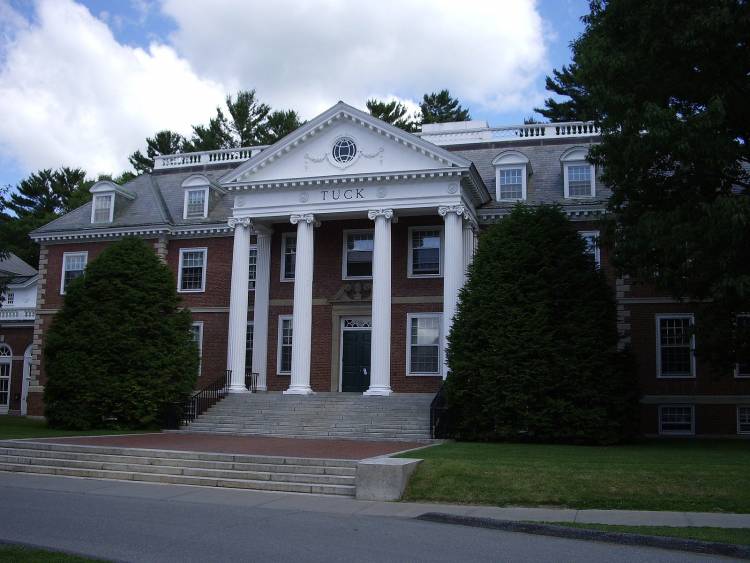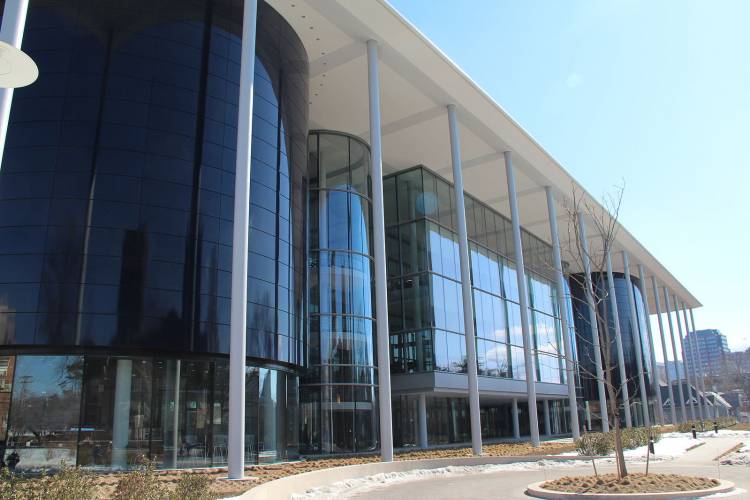Should you choose Dartmouth College’s Tuck School of Business or Yale School of Management for your MBA? It’s not a bad dilemma to have.
Neither program is a member of the “M7” group of elite business schools that includes iconic schools such as Harvard, Stanford GSB, Wharton and MIT Sloan. But both have consistently been included in or near the top-10 of prestigious rankings for the past decade.
 Currently, The Economist places Tuck #8 globally and Yale #11. The Financial Times places Yale #16 and #19 for Tuck, while Bloomberg BusinessWeek believes Tuck is #7 in the US and Yale #16. Tuck’s edge in the latter is due primarily to superior rankings in job placement (#4 compared with Yale’s #42).
Currently, The Economist places Tuck #8 globally and Yale #11. The Financial Times places Yale #16 and #19 for Tuck, while Bloomberg BusinessWeek believes Tuck is #7 in the US and Yale #16. Tuck’s edge in the latter is due primarily to superior rankings in job placement (#4 compared with Yale’s #42).
“Tuck historically has been the more competitive school and the quality tended to be slightly higher. But Yale has made tremendous gains over the years and is increasingly viewed as a top program,” says a Tuck MBA graduate who was admitted to Yale but rejected the offer.
“Yale does also benefit from slightly stronger global brand recognition of the parent institution, which likely helps with international admission numbers.”
There are other key differences between the two schools that MBA applicants need to know about before choosing where to study.
Yale SOM vs Dartmouth Tuck: Location
Location is among the major ones. Yale, in the city of New Haven is more urban. Tuck is more rural, in a picturesque setting. “The geography of Tuck lends itself towards an active and outdoorsy crowd that tends to love the seasons and the sports and activities that come with them,” says a former admissions officer at the school, who now works at admissions consulting firm Stacy Blackman Consulting.
On the other hand, Yale students will have more restaurant choices and cultural opportunities.
Both Yale and Tuck students have a commute to New York City or Boston for job opportunities. Yale benefits from proximity to NYC, which makes recruiting trips easier, though there is a coach—which is operated by a private company—that runs frequently to both Boston and New York; there are also flights to the cities from the nearby Lebanon airport. Yale’s airport, Hartford, is further from campus.
“I appreciated the ability to get to New York from Yale in less than two hours without the New York cost of living,” says Gus Roman, a joint MBA and master’s of public health candidate at Yale.
Yale SOM vs Dartmouth Tuck: Admissions requirements, selectivity and culture
 Many of the admissions requirements are similar, such as GMAT/GRE score, letters of recommendation and essays — with some differences. Yale was among the first schools to introduce “video essays”, in which applicants have a set time limit to answer randomized questions.
Many of the admissions requirements are similar, such as GMAT/GRE score, letters of recommendation and essays — with some differences. Yale was among the first schools to introduce “video essays”, in which applicants have a set time limit to answer randomized questions.
And Tuck this year placed more emphasis on emotional intelligence, or the ability to understand and express emotion, in its application process.
Selectivity at both schools similar, with a roughly 20 percent acceptance rate.
One significant difference is the size of the student body. Yale’s MBA class has approximately 347 students while Tuck has 287. “Tuck has strong emphasis on a collaborative culture. Students are smart, nice, diverse and very engaged in the community,” says the former Tuck admissions officer. Meanwhile, Yale is known to attract a more intellectual, progressive and social justice-minded student body.
Roman, the Yale MBA/MPH candidate, says: “The culture championed by the business and society mission of Yale SOM make it a unique place where everyone has the ability to share their own voice and be heard.”
Both MBA cohorts are diverse, with more than 40 percent women students, though Yale has more international candidates (45 percent compared with 36 percent at Tuck).
Yale has a higher average GMAT score (730 while Tuck’s is 722) and undergraduate GPA (3.71 vs Tuck’s 3.49) — both traditional but not comprehensive measures of candidate quality.
 Admissions consultants and former MBA students describe Yale as more of a progressive program, whereas Tuck’s MBA is considered more traditional.
Admissions consultants and former MBA students describe Yale as more of a progressive program, whereas Tuck’s MBA is considered more traditional.
“From my experience, Yale has a more integrative learning environment where boundaries between disciplines are less rigid,” says the Tuck MBA graduate. “Tuck is a far more traditional program where there are clearly defined lessons in marketing, finance, accounting, strategy, etc.”
Yale SOM vs Dartmouth Tuck: Alumni network and MBA career outcomes
Despite its larger population, Yale is a relatively new business school, having been founded in 1994. By comparison, Tuck arrived on the scene in 1900 as America’s first graduate school of business. “This helps explain why Tuck’s alumni base is considered by many as the most loyal and dedicated of all such networks,” says Alex Min, CEO of The MBA Exchange admissions advisory firm.
According to The Economist’s 2017 alumni effectiveness ranking, Tuck came second globally while Yale was ranked #15.
The career outcomes are similar in terms of industry placement —some 50 percent of both school’s MBAs work in the traditional fields of finance and consulting.
The career placement data does not bear out Yale’s reputation for a more eclectic, varied student body. Only a slightly larger number of graduates work in non-traditional career paths than at Tuck, such as the non-profit sector. Tech is slightly stronger at Tuck.
 Ultimately, Roman at Yale says applicants should visit the schools, meet students and engage with faculty before making their choice.
Ultimately, Roman at Yale says applicants should visit the schools, meet students and engage with faculty before making their choice.
“Get a full spectrum view of the school; walk through the campus, sit in on classes, find a way to go out with the students and hear what they really have to say,” he says.
“Websites and rankings provide one (important) frame to the story, but choosing to spend two years of your professional life resuming academic pursuits deserves a more personal approach.”
Image credits:
- Dartmouth - Tuck: Public Domain
- Yale SOM facade: Nick Allen / CC BY-SA 3.0
- Dartmouth College campus: Public Domain
- Downtown New Haven: Versageek / CC BY-SA 3.0










